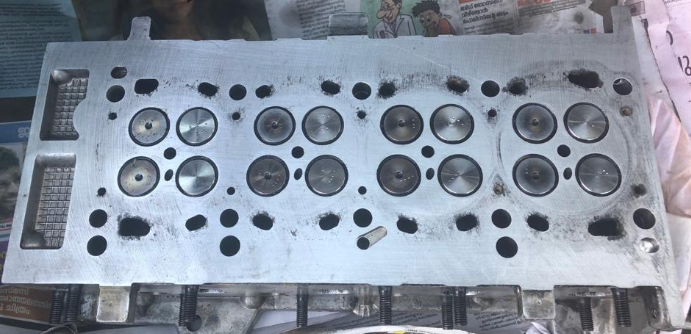I have recently came across a problem. One of the rocker fingers (the one that touches the valve stems, and have cam rollers) on my diesel engine head has broken. This resulted in the pistons hitting the valves due to the missed timings. The entire issue has caused me an engine re-haul. But, as part of the repair, I have been asked to machine the head-block face. Then new valves and new rocker fingers were installed, and the timing chain and sprockets where also replaced after facing. But, I don't fully understand why the expensive process of head-block facing was done in the first place. If you face the head, the mating face on the cylinder block should also be faced for a perfect match, right? Any idea why it should be done?
-
Cylinder heads are prone to warping and gasket imprints since it is aluminum, engine blocks are less prone to this and can be inspected to determine if the block needs surfaced also. I always surface aluminum cylinder heads on engine overhauls.– MoabCommented Jan 4, 2019 at 15:17
2 Answers
It would be helpful to know what engine you are rebuilding but if the repair guide suggests machining the cylinder head only then I suspect that your engine has an alloy cylinder head and a cast iron engine block.
The reason to have the mating surfaces machine is to ensure they are perfectly flat and that you get a good seal on every part of the head gasket with no leaking. I assume that the repair procedure suggests thoroughly cleaning the engine block mating surface and checking it for straightness with a steel rule and feeler gauge or similar.
It's difficult to know what you mean by "expensive process" but the last time I had a cylinder head machined, it cost less than the equivalent of half a tank of fuel. Indeed the last time I did a full engine rebuild, giving the machinist the engine stripped to component parts generated an invoice equivalent to around two tanks of fuel or a pair of branded tyres. Considering that during the rebuild you'll have bought, at least, a gasket set, full set of fluids, timing belt / tensioner and presumably a water pump, the potentially expensive bit isn't the engineering works but the risk that you'll end up having to do the job again with yet another new gasket set if you skimp on ensuring the cylinder head is true.
-
"Alloy-head-cast-iron-block" does this mean, the cast iron is stronger, and thus less likely to have deformations, and the alloy head is not?– C--Commented Jan 4, 2019 at 12:38
-
Yes, cast iron is heavy but strong, alloy heads are lightweight and very effective at heat transfer but relatively soft so more likely to warp. Commented Jan 4, 2019 at 12:39
-
By "expensive", I mean, the head block facing alone costed me about a full-tank of fuel or the price of one branded tyre.– C--Commented Jan 4, 2019 at 12:40
-
1Ask yourself this @Subin Sebastian, how much will it cost to have the engine taken apart again to skim the head when it won't seal against the block? Diesel engines have higher compression ratios and cylinder pressure, they put more stress on the head gasket. An imperfect seal is more likely to lead to failure. Commented Jan 4, 2019 at 13:16
Facing is more common with higher time engines, or ones which are suspected of having a warped head after overheats.
In your instance, the most likely reason for the recommendation from the shop was to reduce the probability of a disassembly caused by a head which did not seal and resulted in an unsatisfactory mating between the block and cylinder head.
Generally the R&R costs are pretty high for the head, compared to a small skimming of the head. However, there is a downside, and that is that some heads, especially on some diesels (VW IDI 1.588L come to mind) have very little margin to skim.
My normal machine shop insists on skimming all heads because they have virtually no problems getting good seals with the cylinder head gasket afterwards, and feel that a clean, smooth surface helps the reassembly reliability.

